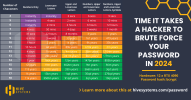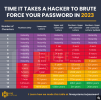HCHTech
Well-Known Member
- Reaction score
- 4,422
- Location
- Pittsburgh, PA - USA
Took over a client recently from a larger MSP in our area. In their data dump, there were a ton of insane passwords, over 100 characters. The main M365 admin password was (now changed, of course):
Rbt2bRjgEtHNgk9m!2.4dk7QJDT46d9_9FmcCFNLr@yjGRNGDRsEMFeCc.kt.kXP3x4oc.sYV9qRRu2VL-6DxrHGNh_po@LR!m9o=
I mean, if your only access is from a computer that you can copy & paste from your documentation system, why not, I guess, but my only wish for them is that they have to on occasion, type those monsters in by hand!
Is this level on nonsense normal on any plane? Really?
Rbt2bRjgEtHNgk9m!2.4dk7QJDT46d9_9FmcCFNLr@yjGRNGDRsEMFeCc.kt.kXP3x4oc.sYV9qRRu2VL-6DxrHGNh_po@LR!m9o=
I mean, if your only access is from a computer that you can copy & paste from your documentation system, why not, I guess, but my only wish for them is that they have to on occasion, type those monsters in by hand!
Is this level on nonsense normal on any plane? Really?


